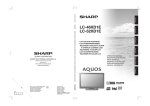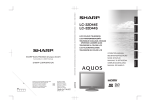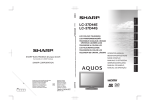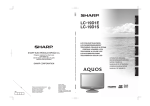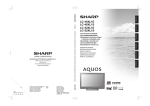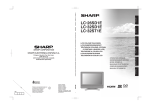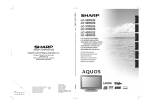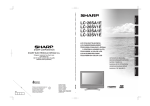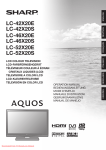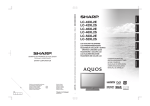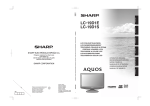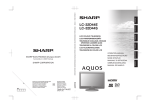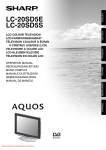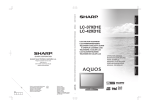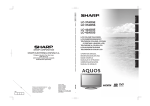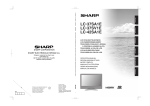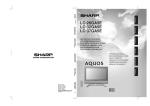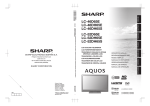Download Sharp LC-46XD1E LCD TV
Transcript
PIN Printed on environmentally friendly paper Auf ökologischem Papier gedruckt Imprimé sur papier écologique Stampato su carta ecologica Afgedrukt op ecologisch papier Impreso en papel ecológico Printed in Spain Gedruckt in Spanien Imprimé en Espagne Stampato in Spagna Gedrukt in Spanje Impreso en España 06P08-SP-NG 1 TINS-C596WJZZ DEUTSCH FRANÇAIS ITALIANO OPERATION MANUAL BEDIENUNGSANLEITUNG MODE D'EMPLOI MANUALE DI ISTRUZIONI GEBRUIKSAANWIJZING MANUAL DE MANEJO NEDERLANDS OPERATION MANUAL / BEDIENUNGSANLEITUNG / MODE D'EMPLOI / MANUALE DI ISTRUZIONI / GEBRUIKSAANWIJZING / MANUAL DE MANEJO Polígono Industrial Can Sant Joan Calle Sena s/n 08174 SANT CUGAT DEL VALLÉS BARCELONA (ESPAÑA) LCD COLOUR TELEVISION LCD-FARBFERNSEHGERÄT TÉLÉVISION COULEUR À ÉCRAN À CRISTAUX LIQUIDES (LCD) TELEVISORE A COLORI LCD LCD-KLEURENTELEVISIE TELEVISIÓN EN COLOR LCD ESPAÑOL C596WJZZ SHARP ELECTRÓNICA ESPAÑA S.A. ENGLISH LC-46XD1E/LC-52XD1E SHARP CORPORATION LC-46XD1E LC-52XD1E ( ) : LC-46XD1E [ ] : LC-52XD1E : LC-46XD1E LC-52XD1E 660.0 660,0 (1127.0 ) / [1263.0] (1127,0 ) / [1263,0] (98.0 ) / [96.0] (98,0 ) / [96,0] (128. 2) / [129.3] (128,2) / [129,3] SPECIAL NOTE FOR USERS IN THE U.K. The mains lead of this product is fitted with a non-rewireable (moulded) plug incorporating a 13A fuse. Should the or and of the same rating as above, fuse need to be replaced, a BSI or ASTA approved BS 1362 fuse marked which is also indicated on the pin face of the plug, must be used. Always refit the fuse cover after replacing the fuse. Never use the plug without the fuse cover fitted. In the unlikely event of the socket outlet in your home not being compatible with the plug supplied, cut off the mains plug and fit an appropriate type. IMPORTANT: The wires in the mains lead are coloured in accordance with the following code: Blue: Neutral Brown: Live As the colours of the wires in the mains lead of this product may not correspond with the coloured markings identifying the terminals in your plug, proceed as follows: • The wire which is coloured blue must be connected to the plug terminal which is marked N or coloured black. • The wire which is coloured brown must be connected to the plug terminal which is marked L or coloured red. Ensure that neither the brown nor the blue wire is connected to the earth terminal in your three-pin plug. Before replacing the plug cover make sure that: • If the new fitted plug contains a fuse, its value is the same as that removed from the cut-off plug. • The cord grip is clamped over the sheath of the mains lead, and not simply over the lead wires. IF YOU HAVE ANY DOUBT, CONSULT A QUALIFIED ELECTRICIAN. 200.0 200,0 DANGER: The fuse from the cut-off plug should be removed and the cut-off plug destroyed immediately and disposed of in a safe manner. Under no circumstances should the cut-off plug be inserted elsewhere into a 13A socket outlet, as a serious electric shock may occur. To fit an appropriate plug to the mains lead, follow the instructions below: 100.0 100,0 ASA 200.0 200,0 (449.0 ) / [489.0] (449,0 ) / [489,0] (575.4 ) / [651.0] (575,4 ) / [651,0] (728.0 ) / [807.0] (728,0 ) / [807,0] 62.0 62,0 (790.0 ) / [869.0] (790,0 ) / [869,0] (1021.4 ) / [1155.0] (1021,4 ) / [1155,0] 309.0 309,0 ENGLISH ENGLISH OPERATION MANUAL • The illustrations and on-screen displays in this operation manual are for explanation purposes and may vary slightly from the actual operations. • The examples used throughout this manual are based on the LC-52XD1E model. Contents Contents .........................................................................................1 Dear SHARP customer..................................................................2 Important Safety Precautions ......................................................2 Trademarks ....................................................................................2 Supplied accessories ....................................................................3 Quick guide ....................................................................................3 Attaching the stand ...................................................................3 Setting the TV ...........................................................................4 TV (Front view) .........................................................................5 TV (Rear view) ..........................................................................5 Inserting the batteries................................................................6 Using the remote control unit ....................................................6 Cautions regarding the remote control unit ..........................6 Remote control unit ..................................................................7 Turning on the power ................................................................8 Standby mode ..........................................................................8 Initial auto installation (Analogue) ...............................................8 Initial auto installation (DTV) .......................................................8 Channel selection using the station list (Analogue) .....................9 Using external equipment...........................................................10 Connecting a VCR .................................................................10 Connecting a game console or camcorder..............................10 Connecting a DVD player ........................................................10 Connecting a decoder ............................................................11 Connecting a PC ....................................................................11 Using AV Link function ............................................................11 Menu operations..........................................................................12 On-Screen Display ..................................................................12 Common operations ...............................................................12 Menu operation without a remote control ................................12 Picture menu ..........................................................................13 Backlight ......................................................................13 Contrast .......................................................................13 Brightness ....................................................................13 Colour ..........................................................................13 Tint ...............................................................................13 Sharpness ....................................................................13 Red ..............................................................................13 Green ...........................................................................13 Blue ..............................................................................13 Colour temp. ................................................................13 Black ............................................................................13 3D-Y/C .........................................................................13 DNR (Digital Noise Reduction).......................................13 I/P setting .....................................................................13 Film mode.....................................................................14 truD(R) ..........................................................................14 Reset ............................................................................14 Sound menu ...........................................................................14 Treble ...........................................................................14 Bass .............................................................................14 Loudness......................................................................14 Auto volume .................................................................14 Balance ........................................................................14 Clear voice....................................................................14 Reset ............................................................................14 Connections menu..................................................................15 Decoder .......................................................................15 Input select ...................................................................15 HDMI setup ..................................................................15 Supply voltage ..............................................................16 AV-Link (EXT 2 only) .....................................................16 Miscellaneous ...............................................................16 Setup menu ............................................................................16 Channels ......................................................................16 Child lock......................................................................17 Auto format ..................................................................17 Language .....................................................................17 Factory settings ............................................................17 Miscellaneous ...............................................................18 Geometry menu ......................................................................18 Picture horizontal ..........................................................18 Picture vertical ..............................................................18 Phase position ..............................................................18 Other menu items ...................................................................19 AV mode ...........................................................................19 Status display ....................................................................19 INPUT SOURCE ................................................................19 Action mode ......................................................................19 Still image ..........................................................................19 OPC ..................................................................................19 Wide modes ......................................................................20 Analogue teletext ....................................................................21 Using analogue teletext menu ............................................21 Newsflash .....................................................................21 Reveal/Conceal ............................................................21 Setup............................................................................22 DTV menu operations .................................................................23 DTV menu operation buttons ..................................................23 DTV On-Screen Display ..........................................................23 DTV common operations ........................................................23 About using the character set screen .................................24 Language................................................................................24 Programme Setup ..................................................................24 Favourite.......................................................................25 Lock .............................................................................25 Move ............................................................................25 Move To .......................................................................25 Skip ..............................................................................25 Select ...........................................................................26 Erase ............................................................................26 Label ............................................................................26 View .............................................................................26 Installation...............................................................................26 Auto Installation .................................................................26 Carrier Scan.......................................................................26 Carrier Setup .....................................................................27 System Setup .........................................................................27 OSD Setup ........................................................................27 Child Lock .........................................................................28 Accessories ............................................................................28 Software Version................................................................28 Software Upgrade..............................................................28 Common Interface ..................................................................29 Inserting a CA card ............................................................29 Supplying power to the antenna..............................................29 About EPG..............................................................................30 Using the EPG ...................................................................30 Using the EPG Timer .........................................................30 Using the ESG ........................................................................31 Using the digital programme list ..............................................31 Viewing a service banner.........................................................31 Using the multi audio function .................................................32 Displaying subtitles .................................................................32 Using the MHEG5 application (UK only) ..................................32 Appendix ......................................................................................33 Troubleshooting ......................................................................33 PC compatibility chart .............................................................34 RS-232C port specifications ...................................................34 Specifications .........................................................................36 Optional accessories...............................................................36 End of life disposal ..................................................................37 1 Dear SHARP customer Thank you for your purchase of the SHARP LCD colour TV product. To ensure safety and many years of troublefree operation of your product, please read the Important Safety Precautions carefully before using this product. Important Safety Precautions • Cleaning—Unplug the AC cord from the AC outlet before cleaning the product. Use a damp cloth to clean the product. Do not use liquid cleaners or aerosol cleaners. • Water and moisture—Do not use the product near water, such as bathtub, washbasin, kitchen sink, laundry tub, swimming pool and in a wet basement. • Do not place vases or any other water-filled containers on this product. The water may spill onto the product causing fire or electric shock. • Stand—Do not place the product on an unstable cart, stand, tripod or table. Doing so can cause the product to fall, resulting in serious personal injuries as well as damage to the product. Use only a cart, stand, tripod, bracket or table recommended by the manufacturer or sold with the product. When mounting the product on a wall, be sure to follow the manufacturer’s instructions. Use only the mounting hardware recommended by the manufacturer. • When relocating the product placed on a cart, it must be moved with utmost care. Sudden stops, excessive force and uneven floor surface can cause the product to fall from the cart. • Ventilation—The vents and other openings in the cabinet are designed for ventilation. Do not cover or block these vents and openings since insufficient ventilation can cause overheating and/or shorten the life of the product. Do not place the product on a bed, sofa, rug or other similar surface, since they can block ventilation openings. This product is not designed for built-in installation; do not place the product in an enclosed place such as a bookcase or rack, unless proper ventilation is provided or the manufacturer’s instructions are followed. • The LCD panel used in this product is made of glass. Therefore, it can break when the product is dropped or impact applied. If the LCD panel is broken, be careful not to be injured by broken glass. • Heat sources—Keep the product away from heat sources such as radiators, heaters, stoves and other heat-generating products (including amplifiers). • To prevent fire, never place any type of candle or naked flames on the top or near the TV set. • To prevent fire or shock hazard, do not place the AC cord under the TV set or other heavy items. • Do not display a still picture for a long time, as this could cause an afterimage to remain. • There is power consumption always if main plug is connected. • Servicing—Do not attempt to service the product yourself. Removing covers can expose you to high voltage and other dangerous conditions. Request a qualified person to perform servicing. The LCD panel is a very high technology product, giving you fine picture details. Due to the very large number of pixels, occasionally a few non-active pixels may appear on the screen as a fixed point of blue, green or red. This is within product specifications and does not constitute a fault. Precautions when transporting the TV When transporting the TV, never carry it by holding onto the speakers. Be sure to always carry the TV by two people holding it with two hands — one hand on each side of the TV. Trademarks • “HDMI, the HDMI logo and High-Definition Multimedia Interface are trademarks or registered trademarks of HDMI Licensing LLC.” • truD is a registered trademark of Micronas in Germany and other countries. • The “HD ready” Logo is a trademark of EICTA. 2 Supplied accessories Remote control unit (g1) Pages 6 and 7 AC cord (g1) Cable tie (g1) Stand unit (g1) Product shape varies in some countries. Page 4 Page 4 Page 3 Cable clamp 3 RCA to 15-pin (Smallg2, Large g1) D-sub adapter (g1) Page 4 Page 10 • “AAA” size battery (g2)..........Page 6 • Operation manual (This publication) Quick guide Attaching the stand Before performing work spread cushioning over the base area to lay the TV on, making sure the area is completely flat. This will prevent it from being damaged. Before attaching (or detaching) stand, unplug the AC cord from the AC INPUT terminal. CAUTION • Attach the stand in the correct direction. • Be sure to follow the instructions. Incorrect installation of the stand may result in the TV falling over. 1 Confirm that there are 10 screws (6 short screws and 4 long screws) supplied with the TV. 3 1 Insert the stand into the openings on the bottom of the TV. 2 Insert and tighten the 4 long screws into the 4 holes on the rear of the TV. Hex key 2 Attach the two supporting posts for the stand unit onto the base using the box for the stand unit as shown below. (Close-up of the upper side of the stand unit) Long screw Soft cushion Hex key NOTE • To detach the stand, perform the above steps in reverse order. 1 2 Short screw Insert each of the protrusions on the two supporting posts into the openings on the upper side of the base. Insert and tighten the 6 short screws with the hex key (supplied with the product) in the order of 1, 2 and 3. 3 Quick guide Setting the TV Place the TV close to the AC outlet, and keep the power plug within reach. Ferrite Core * Standard DIN45325 plug (IEC 169-2) 75 q coaxial cable AC cord Product shape varies in some countries. Bundle the cables with the clamp. Bundle the AC cord with the clamp (small). Cable clamp (large) Cable tie Cable clamp (small) Antenna Connect the antenna cable from your antenna-/cable socket or the (room-/roof) antenna for antenna input terminal on the back of your TV set to receive digitally/terrestrially broadcast stations. An indoor antenna can also be used under good reception conditions. Passive and active room antennas are offered commercially. In an active antenna its power is supplied via the antenna input terminal. The supply voltage (5V) must be correspondingly set under “Supply voltage”. (Page 16) * Ferrite Core The Ferrite Core should be permanently attached and never removed from the AC cord. Setting the TV on the wall • This TV should be mounted on the wall only with the wall mount bracket available from SHARP. (See page 36.) The use of other wall mount brackets may result in an unstable installation and may cause serious injuries. • Installing the LCD Colour TV requires special skill that should only be performed by qualified service personnel. Customers should not attempt to do the work themselves. SHARP bears no responsibility for improper mounting or mounting that results in accident or injury. • You can ask a qualified service personnel about using an optional bracket to mount the TV to the wall. 4 Quick guide TV (Front view) Remote control sensor OPC indicator OPC sensor SLEEP indicator B (Standby/On) indicator TV (Rear view) P (s/r) (Programme [channel] buttons) i (l/k) (Volume buttons) MENU button a (Power button) Antenna input terminal (DVB-T 5V=/80 mA) RS-232C terminal EXT 6 (HDMI) terminal EXT 5 (HDMI/AUDIO) terminals COMMON INTERFACE slot EXT 4 terminals NOTE • Only if you use an active terrestrial antenna, select “yes (5V)” under “Supply voltage”. (Page 16) EXT 1 (RGB) terminal EXT 2 (AV) terminal OUTPUT (Audio) terminals EXT 3 terminals Headphone jack AC INPUT terminal 5 Quick guide Inserting the batteries Before using the TV for the first time, insert two “AAA” size batteries (supplied). When the batteries become depleted and the remote control unit fails to operate, replace the batteries with new “AAA” size batteries. 1 2 Press and slide the battery cover to open it. 3 Close the battery cover. Insert two supplied “AAA” size batteries. • Place batteries with their terminals corresponding to the (e) and (f) indications in the battery compartment. CAUTION Improper use of batteries can result in chemical leakage or explosion. Be sure to follow the instructions below. • Do not mix batteries of different types. Different types of batteries have different characteristics. • Do not mix old and new batteries. Mixing old and new batteries can shorten the life of new batteries or cause chemical leakage in old batteries. • Remove batteries as soon as they have worn out. Chemicals that leak from batteries can cause a rash. If you find any chemical leakage, wipe thoroughly with a cloth. • The batteries supplied with this product may have a shorter life expectancy due to storage conditions. • If you will not be using the remote control unit for an extended period of time, remove the batteries from it. Using the remote control unit Use the remote control unit by pointing it towards the remote control sensor. Objects between the remote control unit and sensor may prevent proper operation. 5m 30° 30° Cautions regarding the remote control unit • Do not expose the remote control unit to shock. In addition, do not expose the remote control unit to liquids, and do not place in an area with high humidity. • Do not install or place the remote control unit under direct sunlight. The heat may cause deformation of the unit. • The remote control unit may not work properly if the remote control sensor of the TV is under direct sunlight or strong lighting. In such case, change the angle of the lighting or TV, or operate the remote control unit closer to the remote control sensor. 6 Remote control sensor Quick guide Remote control unit 1 2 3 4 5 6 7 8 9 10 11 12 13 B (Standby/On) (Page 8) m (Teletext) TV: Display the analogue teletext. (Page 21) DTV: Select DTV data broadcasting and TELETEXT. (Page 32) k (Reveal hidden Teletext) (Pages 21 and 22) [ (Subtitle for Teletext) TV/External: Subtitle on/off. (Page 22) DTV: Display the subtitle selection screen. (Page 32) 3 (Freeze/Hold) (Page 22) 1 (Subpage) (Page 22) – Set the channel in TV and DTV mode. Enter the desired numbers or letters. Set the page in Teletext mode. A (Flashback) Press to return to the previous image in normal viewing mode. DTV Press to access DTV mode while watching other input sources, and vice versa. (Will not work if you were watching DTV immediately before turning off the TV. In this case first select any other input source except DTV using the b button.) 2 (Sound mode) Select the sound multiplex mode. (See below.) e (Mute) Sound on/off i (k/l) (Volume) Increase/decrease volume. LIST DTV: Display the programme list. 1 2 16 3 4 17 18 5 6 7 18 8 19 9 10 11 12 13 14 20 21 22 23 24 25 19 20 26 15 27 28 21 16 17 29 30 22 31 23 24 25 14 15 DTV MENU DTV: Display DTV Menu screen. END Exit the menu screen. 26 E Using 2 on the remote control unit DTV mode: Press 2 to open the multi audio screen. (Page 32) Analogue TV mode: Each time you press 2, the mode switches as illustrated in the following tables. 27 28 NICAM TV broadcasts selection Signal Selectable items A2 TV broadcasts selection Signal Selectable items Stereo Stereo, Mono! Stereo Stereo, Mono! 29 Bilingual Dual-channel Sound 1, Dual-channel Sound 2, Dualchannel Sound 1+2, Mono! Bilingual Dual-channel Sound 1, Dual-channel Sound 2, Dual-channel Sound 1+2 30 NICAM, Mono! Monaural Monaural Mono NOTE • When no signal is input, the sound mode will display “Mono”. • “Mono!” indicates that you have manually changed to FM mono. 31 truD Demonstrate the truD effects in a dual screen format. (Page 14) SLEEP Set the sleep timer on (in units of 30 min. up to max. 2hr. 30min) and off. (If the “Time and date” screen is displayed, enter the time and date as explained on page 18, and set the sleep timer again.) v (Top/Bottom/Full) Set the area of magnification in analogue teletext mode. (Page 22) b (INPUT SOURCE) Select an input source. (TV, DTV, EXT1, EXT2, EXT3, EXT4, EXT5, EXT6) (Page 19) EPG DTV: To display EPG (Electronic Programme Guide) screen. ESG DTV: To display ESG (Electronic Service Guide) screen. RADIO DTV: Switch between RADIO and DTV mode. AV MODE Select a video setting. (Page 19) SURROUND Surround effects on/off. P (r/s) Select the channel. In analogue TV mode, external input sources (EXT 1 - 6) can also be selected. p (Display information) (Pages 18, 19, 30 and 31) MENU MENU screen on/off. (Page 12) a/b/c/d (Cursor) Select a desired item on the setting screen. OK Execute a command within the menu screen. Display the station list in analogue mode and the programme list in DTV mode. RETURN Return to the previous menu screen. Colour (Red/Green/Yellow/Blue) TELETEXT: Select a page. (Page 22) The coloured buttons are used to select correspondingly to the coloured items in the menu screen. OPC To switch the Optical Picture Control on and off. (Page 19) f (Wide modes) Select the wide mode. (Page 20) ACTION (Action mode) Action mode on/off. (Page 19) 7 Quick guide Turning on the power Press a on the TV. Standby mode Press B on the remote control unit when the TV is on. • The TV enters standby mode and the image on the screen disappears. • The B indicator on the TV changes from green to red. • To completely turn off the power to the TV, unplug the AC cord from the AC outlet. However, do not unplug the AC cord unless otherwise instructed. Display status indicator Off Power off Red The TV is in standby mode. The TV is on. Green NOTE • If you are not going to use this TV for a long period of time, be sure to remove the AC cord from the power outlet. • Weak electric power is still consumed even when a is turned off. • In DTV input mode, if the power is turned off immediately after a setting change from the menu screen, the new setting or channel information may not be memorised. Initial auto installation (DTV) Digital Video Broadcasting is a transmission scheme. It is much more than a simple replacement for existing analogue television transmission. DVB provides more stations, clearer picture quality and other services displayed on the screen. It also allows a range of new features and services including subtitles and multiple audio tracks. To watch DTV broadcasts, follow the procedures below to scan all available services in your area. NOTE • Make sure to perform Initial auto installation (Analogue) outlined in the preceding section as well, even if you intend to view only DTV broadcasts. 1 Press DTV (or b, then a/b to select “DTV”, and then press OK) to access the DTV mode. 2 Press DTV MENU and the DTV Menu screen displays. 3 4 Press c/d to select “Installation”. Initial auto installation (Analogue) When the TV powers on for the first time after purchase, the initial auto installation (Analogue) is invoked. Follow the menus and make the necessary settings one after another. NOTE • To reconfigure the initial auto installation settings, go to “Channels” and run “Search wizard” from the Setup menu. (Page 16) 1 2 Setting the on-screen display language 1 Press a/b/c/d to select the desired language listed on the screen. 2 Press OK to enter the setting. Setting the country (“Location of TV set” screen) 1 Press a/b/c/d to select your country or area listed on the screen. 2 Press OK to enter the setting. • An overview of settings to be used for auto search displays. 3 Press OK to start the search. 4 When the auto sorting is completed, the item “Decoder” displays. Press c/d to select “EXT 1” or “EXT 2”, and then press OK. • The TV searches for, sorts and stores all the receivable TV stations according to their settings and the connected antenna. • To abort the initial auto installation in progress, press END. • Make sure to select the terminal (EXT 1 or 2) to which the decoder is connected. 5 A message appears indicating that the first installation is successfully completed. Press OK, if necessary. • If a recording device with AV-Link is connected to EXT 2, the TV automatically starts transferring the station list data to the recording device. 8 Press a/b to select “Auto Installation”, and then press OK. If you have already set the PIN, enter it here. If not, enter the factory preset PIN “1234”. • See page 17 for setting PIN. • A confirmation message displays. Press c/d to select “Yes”, and then press OK to start the search. 5 The TV starts scanning all available DTV and radio services in your area. NOTE • The language and country settings used in this operation are the settings you have already set while executing the Initial auto installation (Analogue). If you want to reconfigure the country setting, for instance after moving to another country, conduct “Search wizard” from the Analogue Menu again. (Page 16) • The DTV services are searched and stored according to the channel number information embedded in the TV signal (if available). If the information is not available, the services are stored according to the order in which they were received. If you would like to sort the order, it is possible to arrange it as explained in page 25. • To cancel the scan in progress, press END. • You cannot select any DTV-related menu items unless “Auto Installation” has been completed. Quick guide Channel selection using the station list (Analogue) Entering characters using the - buttons This section explains how to change/delete/ move/rename stations using the analogue Station List. If you are watching DTV, refer to the “Using the digital programme list” section. (Page 31) You can also select the desired channel from station list numeric buttons or P (r/s). instead of using 1 In analogue TV mode, press OK when no other menu screen is active. Station list 0 1 2 3 4 2 DTV EXT1 EXT2 EXT3 EXT4 EXT5 EXT6 VIDEO ARD ZDF SAT.1 RTL Numerical 5 6 7 8 9 10 11 12 13 14 15 16 VOX S-RTL N-TV DSF 9LIVE PRO7 RTL2 WDR 3 BR HR MDR 3 KIKA Press a/b/c/d or to select the desired station in the station list, and then press OK to tune in the station. • Press Blue to sort the list according to “Alphabetical” or “Numerical”. • Refer to the following table for how each numeric button is assigned a set of characters. Buttons Assigned characters and numbers 0 1, k, l, . (dot), (space) A, B, C, 2 D, E, F, 3 G, H, I, 4 J, K, L, 5 M, N, O, 6 P, Q, R, S, 7 T, U, V, 8 W, X, Y, Z, 9 To delete, move, and rename stations from the station list While in the station list, press Yellow (Change stations). E E Delete Select a station to delete, and then press Red (Delete). Mark more stations with a/b/c/d or , if desired. Confirm with OK or cancel with Red. Move Select a station to move, and then press Yellow (Move). Mark more stations with a/b/c/d or , if desired. Press OK to finish marking. to select the Press a/b/c/d or position to move to. Confirm with OK or cancel with Yellow. • Make sure to select the appropriate block of channels or destination when moving. E Rename Select a station to rename, and then press Blue (Rename). Press any of the numeric buttons to select the desired character. Remember to press and toggle the numeric button quickly, for the transition to the next digit is rather quick. Repeat until the new name is fully spelt out. Confirm with OK or cancel with Blue. • The name can be up to 8 characters. 9 Using external equipment Setting the input source To view external source images, select the input source using b on the remote control unit. (Page 19) INPUT SOURCE Connecting a DVD player TV DTV EXT1 EXT2 EXT3 NOTE EXT4 • The cables marked with * are EXT5 commercially available items. EXT6 • TV-OUT from EXT 1 outputs DTV image when DTV is selected as the input. Otherwise it constantly outputs analogue TV image. • MONITOR OUTPUT from EXT 2 outputs audio only when EXT 4, 5 and 6 is selected as the input. You can use the EXT 3, 4, 5 (HDMI) or 6 (HDMI) terminals when connecting to a DVD player and other audiovisual equipment. AUDIO cable* S-video cable* or Connecting a VCR L-AUDIO-R You can use the EXT 2 terminal when connecting a VCR and other recording equipment. If your VCR supports TV-VCR advanced AV Link systems, you can connect the VCR using the fullywired SCART cable. SCART cable* SCART cable* S-VIDEO VIDEO AV OUTPUT EXT 3 DVD player NOTE • EXT 3: The S-VIDEO terminal has priority over the VIDEO terminals. PB (CB) PR (CR) 3 RCA to 15-pin D-sub adapter (Supplied) Y Decoder COMPONENT Component cable* VCR Composite video cable* EXT 2 (recommended) NOTE • If the above is your connection, make sure to select “EXT 2” under the menu item “Decoder” when you run the Initial auto installation (Analogue) (Page 8) or when changing the setting later (Page 15). • TV-VCR advanced AV Link systems may not be compatible with some external sources. ø 3.5 mm stereo minijack cable* DVD player HDMI-DVI conversion adapter/ cable* Connecting a game console or camcorder A game console, camcorder and some other audiovisual equipment are conveniently connected using the EXT 3 terminals. EXT 4 When using an HDMI-DVI conversion adapter/cable, input the Audio signal here. EXT 5 If not, use EXT 6. DVD player AUDIO cable* S-video cable* or HDMI cable* EXT 6 L-AUDIO-R S-VIDEO AV OUTPUT VIDEO DVD player NOTE • When connecting an HDMI-DVI conversion adapter/cable to the HDMI terminal, the image may not come in clearly. Composite video cable* EXT 3 Game console Camcorder NOTE • EXT 3: The S-VIDEO terminal has priority over the VIDEO terminals. 10 Using external equipment Using AV Link function Connecting a decoder You can use the EXT 1 terminal when connecting a decoder and other audiovisual equipment. EXT 1 This TV incorporates four typical AV Link functions for smooth connections between the TV and other audiovisual equipment. One Touch Play While the TV is in standby mode, it automatically turns on and plays back the image from the audiovisual source (e.g. VCR, DVD). SCART cable* TV Standby Decoder NOTE • If the above is your connection, make sure to select “EXT 1” under the menu item “Decoder” when you run the Initial auto installation (Analogue) (Page 8) or when changing the setting later (Page 15). Connecting a PC EXT 4 RGB cable* ø 3.5 mm stereo minijack cable* EXT 4 PC WYSIWYR (What You See Is What You Record) When the remote control unit of the connected VCR has the WYSIWYR button, you can automatically start recording by pressing the WYSIWYR button. Preset Download Use the EXT 4 terminals to connect a PC. PC When the TV enters standby mode, the connected audiovisual equipment (e.g. VCR, DVD) enters standby mode as well. RGB/DVI conversion cable* ø 3.5 mm stereo minijack cable* NOTE • The cables marked with * are commercially available items. • The PC input terminals are DDC1/2B-compatible. • Refer to page 34 for a list of PC signals compatible with the TV. • Macintosh adaptor may be required for use for some Macintosh computers. • When connecting to a PC, the correct input signal type is automatically detected. Automatically transfers the channel preset information from the tuner on the TV to the one on the connected audiovisual equipment (e.g. VCR) via the EXT 2 terminal. NOTE • Refer to operation manuals of each external equipment for the details. • Only works when the audiovisual equipment is connected to the EXT 2 terminal on the TV with AV Link via a fully wired SCART. • The use of the AV Link function is only possible if the TVset has enforced a complete auto-installation with the connected audiovisual equipment (Page 8, initial auto installation). The availability of the AV Link function depends on the audiovisual equipment used. Depending on the manufacturer and type of equipment used, it is possible that the described functions may be completely or partially unusable. 11 Menu operations On-Screen Display Common operations 1 2 Example TV menu Picture Sound Connections 3 Current AV mode is shown here. (Page 19) SOFT Press MENU and the TV menu screen displays. Press c/d to select the desired menu, and then press OK. Press a/b to select the desired menu item. Press OK to proceed if necessary. TV menu Backlight 0 Contrast 3 Brightness -12 Colour 9 SOFT Tint 0 Backlight 0 Sharpness 3 Contrast 3 Colour temp. High Brightness -12 Black off Colour 9 3D-Y/C off Tint 0 DNR off Sharpness 3 I/P setting Interlace more ... Film mode off truD(R) off Reset no Picture Mid-High Middle Sound • Press a/b to select “more...” and then press OK, if the item you want to adjust is not displayed. Colour temp. High Item highlighted in yellow Black off • This indicates the item currently selected. 3D-Y/C off Item displayed in white DNR off • This indicates an item can be selected. I/P setting Interlace Film mode off NOTE • Some menu items do not appear as explained in this manual depending on the selected parameter, input mode or the type of signal received. • The screens in the operation manual are for explanation purposes (some are enlarged, others cropped) and may vary slightly from the actual screens. Connections truD(R) off Reset no Mid-High Middle 4 Press c/d to select the desired item or move the item to the desired position. Press OK if necessary. 5 Press RETURN repeatedly to return to the last menus, or press END or MENU to exit the menu. Menu operation without a remote control This function is useful when there is no remote control within your reach. Adjusting frequently adjusted items 1 Press MENU briefly to display the direct control screen. • You can adjust the following items: “INPUT SOURCE”, “Brightness”, “Contrast”, “Wide modes” and “Service”. • “Service” is the item reserved only for service personnel. 2 3 Select the item by pressing P r/s. Select or adjust by pressing i k/l. NOTE • The direct control menu screen will disappear if left unattended for several seconds. 12 TitleB Menu operations Picture menu Colour temp.* Various picture-related settings can be optimised. TV menu Adjust the colour temperature to give the best white image. Item Picture Sound Connections SOFT High: White with bluish tone Mid-High: Intermediate tone between High and Middle Middle: Natural tone Mid-Low: Intermediate tone between Middle and Low Low: White with reddish tone Backlight 0 Contrast 3 Brightness -12 Colour 9 Tint 0 Black Sharpness 3 For easier viewing, change the viewing depth by selecting a level for automatically adjusting the dark portion of an image. more ... NOTE • Items with * can be adjusted and reset for each individual AV mode. • Items with ** appear only when “PC (RGB)” for EXT 4 is selected under “Input select”. • Press a/b to select “more...” and then press OK, if the item you want to adjust is not displayed. Backlight* Dims or brightens the screen. Contrast* The contrast settings depend on the brightness of the room. The brighter the surroundings the higher the contrast should be set. Brightness* Set the brightness so that the black areas of the picture only appear black. 3D-Y/C Provide high quality images with minimal dot crawl and cross colour noise by detecting changes in the image. Item off: No detecting Standard: Normal adjustment Fast: Set the optimum image quality for fast-moving images. Slow: Set the optimum image quality for slow-moving images. NOTE • 3D-Y/C may not operate depending on the input signal type or noisy input signal. • 3D-Y/C has even more effect on composite video signals (CVBS). DNR (Digital Noise Reduction) Produce a clearer image. (off, High, Low) Colour* Set the colour intensity according to your personal taste. The colours should appear natural which is best recognizable from the colour of peoples’ faces, for example. I/P setting Adjust the image and input signal can give you a more beautiful picture. Item Tint Set the tint so that the colours appear natural. This can be judged from the colour of peoples’ faces, for example. Interlace: Display finely detailed images for TV or video, etc. Progressive: Display smooth images for still images or graphics, etc. NOTE • The I/P setting is set to “Progressive” when Film mode is “on”. Sharpness* Adjust the sharpness to obtain the desired image definition. Red** PC only Adjust red colour intensity. Green** PC only Adjust green colour intensity. Blue** PC only Adjust blue colour intensity. 13 Menu operations Film mode Automatically detects a film-based source (originally encoded at 24/25 frames/second, depending on the vertical frequency), analyses it and then recreates each frame for film-like picture quality. Sound menu Various sound-related settings can be optimised. TV menu Connections Sound truD(R) SOFT “truD(R)” ensures you steady motion instead of edgy movements and juddering. It further improves the image quality by enhancing contrast and sharpness with advanced video algorithms. When entering the “truD(R)” menu, you can only switch the juddering correction on/off. The picture quality adjustments such as enhanced contrast and sharpness is always on. Treble 0 Bass 4 NOTE • Press truD on the remote control unit to show truD demonstration in a dual screen format. • This effect is greater on fast moving images such as film contents. • If “truD(R)” is activated the items “I/P setting” and “Film mode” will not be displayed in the menu screen. • “truD(R)” will not be displayed in the menu screen depending on the type of signal received (HD signal, etc.). more ... NOTE • Items with * can be adjusted and reset for each individual AV mode. • Press a/b to select “more...” and then press OK, if the item you want to adjust is not displayed. Treble* For weaker or stronger treble Bass* For weaker or stronger bass Reset Loudness Select if you wish to reset all picture-related items to the factory presets. Boosts low and high frequencies to give added punch to playback even at a low volume level. Auto volume The volume may vary when receiving stations with different standards or when switching from station to station or during commercial breaks. You can reduce these differences in volume by activating Auto volume. Switch off the automatic function for the reception of music programmes and live broadcasts for a better sound. Balance Set the balance to achieve equal volume from the right and left sides. Clear voice This function emphasises speech voice against the background noise for more intelligibility. It is not recommended for music sources. Reset Select if you wish to reset all sound-related items to the factory presets. 14 Menu operations Connections menu HDMI setup HDMI (High-Definition Multimedia Interface) terminal selection. TV menu Connections Decoder Setup EXT 2 1 2 Input select HDMI setup Supply voltage Miscellaneous Decoder Make sure to select the terminal (EXT 1 or 2) to which the decoder is connected. NOTE • This setting will be reflected in the “Decoder stations” function under “Miscellaneous”. (Page 16) Input select Press c/d to select “Connections”, and then press OK. 3 Press a/b to select “HDMI setup”, and then press OK. 4 Press a/b to select “EXT5” or “EXT6”, and then press OK. 5 6 Press a/b to select the desired item. no (0V) AV-Link Press MENU and the TV menu screen displays. Press c/d to select the desired setting. HDMI setup items Selectable items Description Signal type* RGB/YCbCr 4:4:4/YCbCr 4:2:2 Select the video signal type from the HDMI terminal. Colour matrix* ITU601/ITU709 Select the internal colour space conversion method when an RGB signal is input. Dynamic range* Normal/ Enhanced Select the signal amplitude range. Usually, select “Normal”. Auto view Enable/Disable Set whether or not to use Wide mode based on signal recognition, including an HDMI signal. Audio select** Digital/Analogue Select “Digital” for audio signal via the HDMI terminal. Select “Analogue” for audio signal via the AUDIO jack. For setting the signal type of external equipment. Input source Signal type EXT 1 Y/C, CVBS, RGB EXT 2 Y/C, CVBS EXT 4 PC (RGB), COMPONENT NOTE • If no (colour) image displays, try to change the other signal type. • Check the operation manual of the external equipment for the signal type. • TV, DTV, EXT3, EXT5 and EXT6 are not displayed in Input Select. • If both CVBS and RGB signals are input to EXT 1 using a SCART cable, the TV may output an RGB signal even though you have designated CVBS for the respective terminal. This happens due to the setting of your external equipment. NOTE • Refer to your external equipment operation manual for the signal type. • Items with * may be greyed out depending on the type of signal input from the external equipment. • Item marked ** is only available when EXT5 is selected. 15 Menu operations Setup menu Supply voltage Antennas with an integrated amplifier need a supply voltage on the antenna line. (Page 4) You can search for stations automatically or manually as well as set the menu language, time and date, child lock, on-screen displays, etc. AV-Link (EXT 2 only) With this function you can transfer the station data of the TV (such as station preset number/name/channel/ frequency) to the recorder if the recorder is set up for AV-Link. This function is available only for conventional analogue stations. TV menu 1 2 Auto format 3 4 Child lock Select “Start transmission”, and then press OK. • The TV transfers the station list to the AV-Link recorders connected to EXT 2. E Decoder stations Encrypted stations should be labelled as decoder stations, so that they can be decoded automatically by the connected decoder. Items Select decoder station(s) Sound encoding Factory settings Miscellaneous Channels The menu contains the automatic station search and the manual station settings. You can re-sort stations, enter and change station names, and delete stations. E Search wizard Use this menu to search for stations automatically once certain settings have been made. (See page 8, Initial auto installation (Analogue) for details.) 1 2 Description Press OK to mark an encoded station. The marking can be removed from a station that has already been marked by pressing the same key. For reception of encoded audio signals select either “always” if these are always encoded or “Automatic” if these are sometimes encoded. For audio signals which are always uncoded, select “never”. E Manual adjustment of AV standard Ask your dealer which standard to select for specific AV equipment (if it is not recognised automatically). Select the appropriate external terminal (EXT 1- 3) and its AV standard as advised. E Allow switching voltage If this function is activated and you switch to an AV device (connected to EXT 1 or 2) that delivers switching voltage to playback, its picture and sound will be reproduced immediately at all TV presets. (This function is available only for analogue TV and DTV mode.) on Language Press c/d to select “Connections”, and then press OK. Press a/b to select “AV-Link”, and then press OK. Geometry Channels Press MENU and the menu screen displays. Miscellaneous 16 Setup Press MENU and the TV menu screen displays. Press c/d to select “Setup”, and then press OK. Press a/b to select “Channels”, and then press OK. Press a/b to select “Search wizard”, and then press OK. • You will get a table for the auto station search. 3 If necessary select “Change search settings”, and then press OK. Otherwise skip to step 8. 4 Press a/b/c/d to select your country or area listed on the screen, and then press OK. 5 Indicate whether you wish to have “all” stations or “new ones only” searched for using c/d, and then press OK. 6 Select the desired TV/colour standard, and then press OK. 7 Specify from which station position onwards the stations are to be stored, and then press OK. 8 Press a/b to select “Start search”, and then press OK. NOTE • The station search may take some time. • Do not make any entries or switch off the set during this time. • When the search has ended you will be shown the found and stored stations sorted in numerical order. • After the station search has been completed, close the table by pressing END. Menu operations E Manual tune Use the manual tune option when receiving TV signal whose TV/Colour standard deviate from the one specified already. However, this requires detailed knowledge. 1 2 Press MENU and the TV menu screen displays. 3 Press a/b to select “Channels”, and then press OK. 4 Press a/b to select “Manual tune”, and then press OK. 5 Now enter the necessary setting parameters for each menu item. Press c/d to select “Setup”, and then press OK. • For “Channel” and “Frequency”, you can initiate the search by pressing Blue (Search) or simply enter the number if you know it. • For items “TV stand.” and “Col. standard”, you must first press OK (Adopt) to confirm the change. 6 When you have finished the adjustments, press Red (Store) to store the new settings. 7 Next, select the channel position to store the new settings. Press Red to overwrite the current station or Blue to insert the new channel. Item Channel: You can enter the channel number directly here. Press c/d to move between the receiving channel modes. Frequency: You enter the frequency directly using the numeric buttons. For fine tuning, use the c/d buttons. Fine tuning may be necessary for analogue channels or for recorder playback via the antenna connection. Name: You can enter an 8-character channel name. Refer to page 9 for the character input method. TV stand.: Ask your dealer which standard to select for specific channels or AV equipment. (B/G, I, L, D/K) Col. standard: Ask your dealer which standard to select for specific channels or AV equipment. Selectable colour standard varies depending on the selected TV standard. (Auto, PAL, SECAM) E Change stations You can move stations, enter or change station names, and delete stations. The operation is the same as explained in page 9, “To delete, move, and rename stations from the station list”. Child lock With the child lock you can bar access to all stations immediately or daily for a certain time period. To use this function, you have first to define your PIN. NOTE • To view a locked channel, you must enter the PIN. (See page 28 for locking channels from viewing in DTV mode.) • The TV power will be turned off if no PIN is entered for several seconds. E Lock immediately You can lock out all stations immediately by selecting “yes”. The lock is effective immediately and effective whenever you turn on the TV. E Lock daily Here, enter the daily time period, for which your TV set is to be locked. E Change PIN This allows you to change your PIN. NOTE • When in analogue TV mode, the current PIN becomes invalid if you choose “no” for both “Lock immediately” and “Lock daily”. • As a precautionary measure, make a note of your PIN on the back of this operation manual, cut it out and keep it in a safe place that children cannot reach. • See page 33 if you lose or forget your PIN. Auto format When Auto format is switched on, the TV recognises the wide picture mode for Cinemascope or widescreen films and adjusts itself accordingly. NOTE • Use Wide modes if an image does not switch to the desired screen format. • When 4:3 picture format (i.e., “Normal”) is manually selected using the Wide modes function, the Auto format function is temporarily disabled. Select another input source or reset the TV power to restore the Auto format function, and the 4:3 picture format will be automatically selected depending on the transmitted signal. Language You can select a language from the Setup menu. Select from among 13 languages. (Dutch, English, Finnish, French, German, Greek, Italian, Polish, Portuguese, Russian, Spanish, Swedish, Turkish) Factory settings Call up the predefined sound and picture factory settings. Unlike the “Reset” options provided in the Picture and Sound menus, this will reset all parameters to the default value all across the various input modes and AV mode options. 17 Menu operations Miscellaneous Geometry menu E No signal off When set to “Enable” the TV will automatically enter the standby mode if there is no signal input for 6 minutes. TV menu ->Setup Miscellaneous No signal off TV menu Channels Enable Child lock Disable On-screen displays Time and date NOTE • When a TV programme finishes, this function may not operate. • This function is not available in DTV mode. E On-screen displays Here you can determine which on-screen displays are to be shown by pressing p on the remote control. Items Description On-screen display Sets the duration of the TV status and station time name display. • This setting also affects other TV screens. (Volume, Surround, etc.) Sound mode Sound mode display on/off (“yes”/“no”) Time Time information display on/off (“yes”/“no”) E Time and date When you receive teletext, the correct date and time setting is picked up automatically by the set. If you do not receive teletext, you should set the “Date” and “Time” manually. Also you have additional items you can adjust as outlined below. NOTE • Time and date information configured manually cannot be overridden automatically by the set. • If the power to the set is cut off (disconnection of AC cord, power outage, etc.), the auto time acquisition mode through teletext reactivates. Items 18 You can set the geometry values of the picture such as picture position and phase relation. The adjustments are stored independently for each input mode. Description Time If you receive a station with teletext after switching on your TV set, the time and date are automatically registered. In the case of some stations, the date may have to be entered manually. For stations without teletext, enter the time (00:00 to 23:59) and the date (day.month. year) using the numeric buttons on the remote control. Date See the above item “Time”. Beginning of daylight-saving time Enter the date for the beginning of daylightsaving time if it deviates from the date calculated automatically. End of daylightsaving time Enter the date of the end of daylight-saving time if it deviates from the date calculated automatically. Picture Geometry Picture horizontal 0 Picture vertical 0 Phase position 0 Picture horizontal Sets the horizontal picture position by moving the picture left and right. Picture vertical Sets the vertical picture position by moving the picture up and down. Phase position PC only Adjusting the phase relation ensures a picture without flicker and noise. (Available only for RGB signal) Menu operations Other menu items INPUT SOURCE Some of the useful features can be directly called up by pressing assigned buttons on the remote control. AV mode 1 AV mode gives you five viewing options to choose from to best match the system environment, which can vary due to factors like room brightness, type of programme watched or the type of image input from external equipment. 1 2 Press AV MODE. AV mode • The AV mode menu displays. STANDARD Press AV MODE or a/b while the AV mode menu displays on the screen. ECO 2 To watch images from external AV equipment, press b. (Page 10) DYNAMIC USER STANDARD: For a highly defined image in a normally bright room (Enhanced Picture Contrast: On) SOFT: Creates a softer image. (Enhanced Picture Contrast: On) ECO: Reduces power consumption. (Enhanced Picture Contrast: Off) DYNAMIC: For a clear-cut image emphasising high contrast for sports viewing. (Enhanced Picture Contrast: On) USER: Allows the user to customise settings as desired. You can set the mode for each input source. (Enhanced Picture Contrast: Off) NOTE • You can adjust the factory presets given in “STANDARD”, “SOFT”, “ECO” and “DYNAMIC”. • You can assign different AV mode to each external input source. • Enhanced Picture Contrast technology detects the source video characteristics and smoothly adjusts the screen brightness accordingly, enabling deeper black levels. • Enhanced Picture Contrast is activated when you turn the OPC function off for the items “STANDARD”, “SOFT” and “DYNAMIC” in AV mode. Status display Press p, a status display appears for a few seconds. INPUT SOURCE TV • To close the INPUT SOURCE screen, press b again. DTV Press a/b to select the corresponding terminal, and then press OK. EXT2 EXT1 EXT3 EXT4 EXT5 EXT6 SOFT • As you toggle down the options, each is immediately reflected on the screen. No need to press OK. Item 2 ZDF Use the INPUT SOURCE screen to select/check the external equipment connected to the terminal(s) on the back of the TV. Action mode This function improves LCD response and moving picture quality by reducing motion blur. Press ACTION to turn the Action mode on/off. • The Action mode screen indicates the current on/off status. • The Action mode screen goes out afters several seconds. Still image You can freeze a motion picture on the screen. 1 2 Press 3. Press 3 again to exit still image. NOTE • This function may not be available depending on signal condition. OPC Automatically adjusts the brightness of the screen. Press OPC on the remote control unit to switch the Optical Picture Control on and off. NOTE • When set to “on”, the TV senses the surrounding light and automatically adjusts the backlight brightness. Make sure no object obstructs the OPC sensor, which could affect its ability to sense surrounding light. • Under the factory default condition, OPC becomes active when you select “ECO” for the AV mode. • OPC turns off whenever an adjustment is made to the “Backlight” setting. • OPC can be adjusted and reset for each individual AV mode. Mono 13:51 • In the top line you can see the name of the programme. See page 18 for how to customise the settings for the status display. 19 Menu operations Wide modes You can select the picture size. Selectable picture size varies with the type of signal received. Basically, if you set Auto format to “on” in the Setup menu, the optimum Wide mode is automatically chosen for every broadcast. You can however, change the screen format manually as explained below. NOTE • Aside from manually changing the Wide modes as explained herein, the TV may detect and select the optimum Wide mode according to the signal received. 1 Press f. 2 Press f or a/b while the Wide modes menu displays on the screen. Wide modes PC only You can select the picture size. 1 2 Press f. • The Wide modes menu displays. Press f or a/b to select a desired item on the menu. NOTE • Connect the PC before making adjustments. (Page 11) • Selectable picture size may vary with input signal type. EXAMPLE • The Wide modes menu displays. • The menu lists the wide mode options selectable for the type of video signal currently received. Normal Full • As you toggle down the options, each is immediately reflected on the screen. No need to press OK. Item (for SD (Standard) signal) Full: For 16:9 squeeze pictures. Normal: For 4:3 “standard” pictures. A side bar appears on each side. Panorama: In this mode the picture is progressively stretched toward each side of the screen. Cinema 16:9: For 16:9 letterbox pictures. Bars may appear on the top and bottom with some programmes. Cinema 14:9: For 14:9 letterbox pictures. Bars may appear on the top and bottom with some programmes. Item (for HD (High-Definition) signal) Full: Display with the Overscan image. Crop all sides of screen. Underscan: Display with the Underscan image. (Display with the High-Definition image compressed optimally. Noise may appear on the edge of the screen with some programmes.) 20 Item Full: An image fully fills the screen. Normal: Keeps the original aspect ratio in a full screen display. Menu operations Analogue Teletext Using analogue teletext menu While in the analogue teletext mode, press MENU to display the Teletext Menu. What is Teletext? Teletext broadcasts pages of information and entertainment to specially equipped television sets. Your TV receives Teletext signals broadcast by a TV network, and decodes them into graphical format for viewing. News, weather and sports information, stock exchange prices and programme previews are among the many services available. Turning on and off Teletext 1 Select a TV channel or external input source providing the Teletext programme. 2 Press m to display the Teletext. 100 100 ARD-Text 10.09.04 ARD TEXT Teletext im Ersten 14:14:42 Index > 101 Bulmahn: Bildung statt Eigenheim . . . . . . . . Wird auch der Nahverkehr teurer? . . . . . . . . Australien: Keine Zugeständnisse . . . . . . . . Tote bei Zugunglück in Schweden . . . . . . . . 120 121 122 532 Tennis: Haas unterliegt Hewitt . . . . . . . . . . . . 204 Formel 1: Schumacher erneut vorne . . . . . . . 213 Menu Newsflash Reveal Setup Newsflash If you activate “Newsflash” in the teletext menu, the current page is hidden. The m symbol at the top left shows that the newsflash function is enabled (you are in teletext mode). If its contents are updated and it is a small news window, then this is displayed. If, however, it is a page that fills the screen, the symbol is shown in blue and the page can be displayed by pressing OK. Reveal/Conceal The teletext contains hidden information e.g., for quiz questions or VPS times in programme preview pages. This is the same function as pressing k. Tagesschau . . 110/112 Kultur. . . . . . . . . 500 Wetter. . . . . . . . . . . 170 Gesellschaft . . . 530 Sport. . . . . . . 200/600 Lotto/Toto . . 666 TV Guide . . . 300/400 Wirtschaft. . . . . . 700 Internet: www.ard-text.de Inhalt tagesschau – + Page selection • Many stations use the TOP operating system, while some use FLOF (e.g. CNN). Your TV supports both these systems. The pages are divided into topic groups and topics. After switching on the teletext, up to 2000 pages are stored for fast access. 3 Press m again to display the Teletext on the right screen and the normal image on the left screen. • Each time you press m, the screen switches as shown below. • If you select a programme with no Teletext signal, “No text” displays. • The same message displays during other modes if no Teletext signal is available. TELETEXT TELETEXT NOTE • Teletext will not work if the selected signal type is RGB. (Page 15) 21 Menu operations Buttons for teletext operation Setup Buttons Description Menu Setup Newsflash Colour (Red/ Green/Yellow/ Blue) Reveal Sub-title pages Teletext subtitles with nomal size Character set Standard HiText yes Russian Greek E Sub-title pages Some stations provide teletext subtitles for the hearing impaired. For every station you can enter the teletext page on which subtitles can be found. The factory setting for all stations is page 150. This function can be started by pressing [ with the menu screen open. E Teletext subtitles This function displays subtitles transmitted via teletext in normal or double size. E Character set You can set the teletext language display to the language listed. This is necessary, for example, for Turkish or Polish teletext. E HiText HiText (Level 2.5) can be used to select an improved teletext video display. This will be effective as soon as the TV station broadcasts the required information. 22 v (Top/ Bottom/Full) Select a group or block of pages displayed in the coloured brackets at the bottom of the screen by pressing the corresponding Colour (Red/Green/Yellow/Blue) on the remote control unit. Directly select any page from 100 to 899 by using . Switch the Teletext image to Top, Bottom or Full. Reveal or conceal hidden information such as k (Reveal hidden Teletext) an answer to a quiz. 3 (Freeze/ Hold) Stop updating Teletext pages automatically or release the hold mode. [ (Subtitle for Teletext) Display the subtitle or exit the subtitle screen. • Subtitle will not be displayed when the service does not contain the subtitle information. 1 (Subpage) Reveal or hide subpages. • c/d button: Select subpage. • Red button: Move to the previous page. • Green button: Move to the following page. • These two buttons are shown on the screen by the signs l and k. DTV menu operations DTV menu operation buttons Use the following buttons on the remote control unit to operate the DTV Menu. DTV On-Screen Display Example DTV MENU / Language 1 2 3 4 5 6 7 Select 1 2 3 [: m: Press to display the subtitle selection screen. Press to display TELETEXT or start the MHEG5 presentation, if available. : Aside from direct channel entry, each of the numeric buttons have a unique function assigned in the Programme Setup screen. DTV: Press to access DTV mode. EPG: Press to open the EPG screen. ESG: Press to open the ESG screen. RADIO: Press to switch between TV and RADIO mode. • Due to large variation in transmitted volume levels in RADIO mode, some stations will produce distortion if the volume level is set too high. Press to open the multi audio screen. 2: DTV MENU: Press to open or close the DTV Menu screen. LIST: Press to open the Programme List. Press to open the service banner or view p: detailed information from the EPG/ESG screen. a/b/c/d: Press to select a desired item on the screen or adjust a selected item. OK: Press to go to the next step or complete the setting. Press to open the Programme list when no other menu screen is active. (Except external input.) END: Press to exit the current menu screen without saving the changes. Colour: Each of the coloured buttons have a unique function assigned in the menu screen. RETURN: Press to return to the previous step. 4 5 6 7 DTV MENU OK END Language • To customise the language preference for audio and MHEG5 application. Programme Setup • To configure various settings for each service. These include: Fav(ourite), Lock, Move, Move To, Skip, Select, Erase, Label, and View functions. Installation • To scan all services available in your area, or to label/ erase/re-scan the selected carrier. System Setup • To configure On-Screen Display and Child Lock settings. Accessories • To display the current version of the software or to allow the software upgrade to take place. Common Interface • To display the current Common Interface details. Navigation buttons • To navigate within the DTV Menu screen. DTV common operations DTV common menu operation 1 2 Press DTV or b to access the DTV mode. 3 Press c/d to select the desired menu, and then press OK if necessary. Press DTV MENU and the DTV Menu screen displays. • From this point, menu operations differ depending on the item you are going to adjust. See the respective section of the menu operation. • You cannot select any DTV-related menu items unless “Auto Installation” has been completed. • Press RADIO to switch between DTV and Radio mode. • To exit the current screen without saving the change, press END. 23 DTV menu operations Language About using the character set screen In some cases you may be prompted to enter characters. See below for details. Select language settings for audio (if a programme is broadcast in more than one language) and MHEG5 service. Press OK while the cursor is on “Language”. Sample Alpha Numerical Character Set screen 1 2 3 Select a desired language for each item. Alpha Numerical Character Set 1 2 FAV + ! ~ # $ % & ‘ ( ) * , - . / 0 1 2 3 4 5 6 7 8 9 ; : < _ > ? @ A B C D E F G H I J K L M N O P Q R S T U V W X Y Z [ \ ] ^ ` = a b c d e f g h i j k l m n o p q r s t u v w x y z 4 5 1 2 3 4 5 6 NOTE • See page 17 to change the language displayed on-screen. • See page 32 to change the subtitle language. • See page 32 for details on the MHEG5 service. 3 Select 0...9 OK END 6 Input area Space To add or overwrite with a space. Character select area YELLOW (Select) button Press to move between the input area and character select area. a/b/c/d button Press to move the cursor. OK button While in the input area: Confirms the new name. Once OK is pressed to confirm, a confirmation message displays. Press c/d to select “Yes”, and then press OK. While in the character select area: Confirms the input of a character. Sample operation using Alpha Numerical Character Set 1 Available language list Greek Basque Italian Catalan Norwegian Croatian Polish Czech Portuguese Danish Russian Dutch Serbian English* Slovak Finnish Spanish French Swedish Gaelic* Turkish Gallegan Welsh* German * Languages available for MHEG5 service Programme Setup Configure various settings for each service. Press the numeric buttons to access each preassigned of the functions explained below. Press OK while the cursor is on “Programme Setup”. Sample Programme Setup screen Programme Setup S.No Services Fav Lock 2 Press YELLOW (Select) to move the cursor to the character select area. 3 Press a/b/c/d to select the desired character, and then press OK. Repeat until the new name is fully entered. BBC 002 BBC News 003 BBC 1 004 BBC 2 4 To register the new name, press YELLOW (Select) to move the cursor back to the input area. 5 Press OK. 6 Press c/d to select “Yes”, and then press OK. • A confirmation message displays. 1. 3. 5. 7. 9. Select Skip Erase Move 1 001 Call up the character set screen while in the “Label” or “Carrier Setup” screen. (Pages 26 and 27) • Use space to add a space or overwrite. 24 Press a/b to select “1st Pref. Audio”, “2nd Pref. Audio”, “3rd Pref. Audio” or “MHEG”. 0...9 DTV MENU OK Fav Move Skip Erase View END 2. 4. 6. 8. Lock Move To Select Label RADIO TV/Radio NOTE • The picture window shows a blank image if Radio services are listed. DTV menu operations Favourite Move To Assign services to 4 different favourite groups. Use this function to change the position of two selected services 1 2 Press a/b to select the desired service. 3 Press a/b to register the selected service to any of the 4 favourite groups (None, Fav 1 ... Fav 4) and then press OK. An icon displays indicating the favourite status. Press on the remote control. A selection box displays. 1 2 3 4 Press OK. Press on the remote control. numeric Enter the number using buttons, and then press OK. The positions of the selected services are switched. • Do not press END to exit the screen here if you wish to register the change. • You cannot enter a service number that is not listed. • Do not press END to exit the screen here if you wish to register the change. 4 5 Press a/b to select the desired service. Now you can easily select your favourite service from the Programme List. (Page 31) Press OK again, the message “Successfully updated” displays. The change is now registered. NOTE • You cannot register the same service to two different favourite groups. 001 ZDF 001 RTL 002 ARD 002 ARD 003 SAT. 1 003 SAT. 1 004 RTL 004 ZDF s Lock Skip When the service is locked, you must enter your PIN whenever you tune to the service. Services that are set to skip will not be picked up when pressing P (s/r). 1 2 Press a/b to select the desired service. on the remote control. Press If you have already set the PIN, enter it here. If not, enter the factory preset PIN “1234”. An icon displays indicating the service is locked. • Pressing will turn the lock icon on and off. (PIN entry is required when lifting the lock icon.) • Do not press END to exit the screen here if you wish to register the change. 3 Press OK. 1 2 Press a/b to select the desired service. on the remote control. An icon Press displays indicating the service to be skipped. • Pressing will turn the skip icon on and off. • Do not press END to exit the screen here if you wish to register the change. 3 Press OK. NOTE • To view services that are set to be skipped, use numeric buttons or select from the Programme List. NOTE • See page 17 for setting the PIN. Move Sort the order of the selected service by moving the service position. 1 2 Press a/b to select the desired service. on the remote control. An icon Press displays indicating the service to be moved. • Pressing 3 will turn the move icon on and off. Move the selected service to the desired position using a/b, and then press OK. • Do not press END to exit the screen here if you wish to register the change. 4 Press OK to register the change. EXAMPLE: Moving “002 ZDF” ahead of “001 ARD”. Default order: Press a/b to select the desired service in 001rs002rs003rs004. Sorted order: Press a/b to select the desired service in 002rs001rs003rs004. 001 ARD 002 ZDF 002 ZDF 001 ARD 003 SAT. 1 003 SAT. 1 004 RTL 004 RTL s 25 DTV menu operations Installation Select Use this function to jump to the specific service in one step. This is useful when there are many services displayed on screen to scroll through. 1 on the remote control. Now you can Press change the service number on the left side of the screen. 2 numeric Enter the number using buttons, and then press OK. The highlight moves to the selected service. Erase Erase the selected service(s) from the memory. 1 2 Press a/b to select the desired service. on the remote control. An icon Press displays indicating the service to be erased. • Pressing will turn the erase icon on and off. • Do not press END to exit the screen here if you wish to register the change. 3 Press OK. 4 Press c/d to select “Yes”, and then press OK. • A confirmation message displays. This section describes how to reconfigure the DTV settings after conducting Initial auto installation (DTV) on page 8. Auto Installation The TV automatically detects and stores all available services in your area. See Initial auto installation (DTV) on page 8 for details. NOTE • If the TV detects a new carrier/service that has become available after performing “Auto Installation”, the message “Do you want to save?” displays. Press c/d to select “Yes” or “No”, and then press OK. Carrier Scan Manually add a new carrier by entering the desired carrier number or frequency band. 1 2 Press c/d to select “Installation”. Press a/b to select “Carrier Scan”, and then press OK. If you have already set the PIN, enter it here. If not, enter the factory preset PIN “1234”. Label Carrier Scan Change individual service names. 1 2 Press a/b to select the desired service. 3 Enter new name for the service. See page 24 for operations using the character set screen. on the remote control. A character set Press screen displays. View 3 Press END to exit the Programme Setup screen to view the image in full screen. Press 0...9 DTV MENU OK END Press a/b to select “Channel”, then c/d to enter the carrier number, and then press OK. 4 After the scan is complete, the screen shows all available services for the selected range. 5 A confirmation message displays. Press c/d to select “Yes”, and then press OK to save the change. on the remote control. • The image shown in the picture window changes. 554000 • The frequency of the selected carrier in the below cell changes correspondingly. Tune to the service shown in the picture window. Press a/b to select the desired service. Ch-35 Frequency (kHz) Select 3 1 2 Channel NOTE • You can directly enter the frequency instead of step 3. In this case, select “Frequency (kHz)”, enter the number using numeric buttons, and then press OK. Use c/d to move between the digits. • After performing “Carrier Scan”, the order stored by using the “Move” function will revert to the default order. • See page 17 for setting the PIN. 26 DTV menu operations Carrier Setup System Setup This is provided for you to rename (label), erase, or rescan carriers. “Carrier” in this context refers to a service station that provides a set of individual services. 1 2 Press c/d to select “Installation”. Press a/b to select “Carrier Setup”, and then press OK. If you have already set the PIN, enter it here. If not, enter the factory preset PIN “1234”. Configure On-Screen Display and Child Lock settings. OSD Setup The On-Screen Display appearance and the position/ duration of the service banner information can be customised. 1 2 Press c/d to select “System Setup”. Press OK. Carrier Setup OSD Setup S.No Carrier Name Frequency TV Radio 001 BBC 538000 05 03 002 BBC 546000 06 08 003 Canal+ 554000 04 00 004 Digital5 592500 06 02 Label Select Erase DTV MENU Banner timeout 4 Secs Banner position Bottom Transparency Select Rescan OK END 1 To rename the selected carrier: Select the carrier, and then press RED (Label). The character set screen displays. Enter a new name for the carrier. See page 24 for details on using the character set screen. 2 To erase the selected carrier: Select the carrier, and then press GREEN (Erase). An icon displays indicating the carrier to be erased. Pressing GREEN will turn the erase icon on and off. Press OK. A confirmation message displays. Press c/d to select “Yes”, and then press OK. 3 To re-scan the selected carrier: Select the carrier, and then press BLUE (Rescan). Re-scanning starts. A confirmation message displays. Press c/d to select “Yes”, and then press OK. NOTE • After re-scanning the selected carrier, the order stored by using the “Move” function will revert to the default order. 20% DTV MENU OK END 3 4 Press a/b to select the desired item. 5 A confirmation message displays. Press c/d to select “Yes”, and then press OK to save the change. Press c/d to select the desired parameter, and then press OK. OSD Setup items Selectable items Description Banner timeout 1 Sec/2 Secs/ ... 7 Secs/None Select how long the service banner information appears on screen. Banner position Top/Bottom Transparency None /10% /20%/...50% Select whether the service banner information appears on top or bottom of the screen. Select the desired level of On-Screen Display transparency. 27 DTV menu operations Software Upgrade Child Lock This function allows TV and Radio services to be restricted. It prevents children from watching violent or sexual scenes that may be harmful. 1 2 Press c/d to select “System Setup”. 3 If you have already set the PIN, enter it here. If not, enter the factory preset PIN “1234”. 4 Press c/d to select the desired age/rating (4 ...18/Universal/Parental/X-rated/None), and then press OK. Press a/b to select “Child Lock”, and then press OK. The software for controlling the built-in DTV decoder can be upgraded when necessary. In Great Britain this can be achieved via an Over Air Download. Preparation Confirm and make a note of the current software version number as in step 2 of Software Version. Manual upgrade 1 2 Select 7 DTV MENU OK END NOTE • “Universal” and “Parental” are the ratings used exclusively in France. • “X-rated” is the rating used exclusively in Spain. • For details about ratings see page 35. Accessories Check the version information of the digital module and allow it to be upgraded (when available). Press a/b to select “Software Upgrade”, and then press OK. The TV checks all carriers if there is a new software available for upgrade. 1 If upgrade via Over Air Download is available at the time: A confirmation message appears asking you to accept the upgrade or not. To download now, press c/d to select “Yes”, and then press OK. After the upgrade is completed, the TV restarts automatically with the new software version installed. To postpone the download, press c/d to select “No”, and then press OK. Enter the download time for more convenient time as instructed. The software upgrade will not be carried out if there is no new software available at the specified download time. 2 If upgrade via Over Air Download is NOT available at the time: A message tells you that there is no software available to be downloaded. Child Lock Age/Rating Press c/d to select “Accessories”. 3 Software Version Check the new software version number to confirm the successful upgrade. Auto upgrade 1 2 Press c/d to select “Accessories”. 1 When you tune to the service that provides the upgrade via Over Air Download, a confirmation message displays. 2 3 Follow the screen prompts. Press OK. • The software version is displayed. Check the new software version number to confirm the successful upgrade. NOTE • To scan all carriers for upgrade availability, perform the manual upgrade. • The software upgrade may take about 30 minutes, but may take longer (up to 1 hour) depending on the signal status. While updating, you cannot switch to TV or external input mode or enter standby mode using B on the remote control unit. CAUTION • Do not cut off the power to the TV in any way when the software upgrade is in progress, as this may cause the upgrade to fail. If problem arises ask a qualified service personnel before the software upgrade period expires. 28 DTV menu operations Common Interface Inserting a CA card Check the detailed information on the Common Interface module card in use. 1 Press OK while the cursor is on “Common Interface”. • The CI module name is displayed. CI Module Module Name A single DVB Common Interface (CI) will be implemented to allow adoption of a Conditional Access (CA) system by means of a plug-in CA module. Scrambled Broadcasting service can be routed via the CA system. If the CA system on the CI module requires a smartcard reader, this reader shall be part of the CI module. When the compatible CA card is inserted, you can view the programme without any operations. IRDETO DTV MENU OK END 2 Press OK to access the CI menu. 3 Press a/b to select the item, and then press OK. • Detailed information on the CI card in use is displayed. CA card Common Interface Module • Detailed information on the selected item is displayed. When the compatible card is not inserted: 1 Select the programme which needs the compatible CA card. • The caution screen appears. 2 Insert the compatible CA card. • The caution screen disappears and you can view the programme. CA system supported by Crypto Works Aston CAM VIAccess Nagra Vision Irdeto MR CAM NOTE • To view paid TV broadcasting, you need to make a contract with a service provider. Please contact a service provider for details. • The Common Interface Module and the CA card are neither supplied nor optional accessories. Supplying power to the antenna You may choose to supply power through the antenna terminal. (Page 4) NOTE • This function is enabled using the Analogue Menu. See page 16 for details. 29 DTV menu operations About EPG 3 With the Electronic Programme Guide (EPG), you can check the schedule of DTV and Radio events, view detailed information about them, tune to an event currently on-air and set a timer for future events. General EPG screen 1 2 3 EPG 070 BBC News Services When the Timer is set, the TV automatically tunes to a preset TV event when its on-air time begins. 07:00 BBC News The B BBC 1 *** BBC 2 *** CBBC Channel *** Page l Select *** 08:00 *** 09:00 *** *** *** *** *** Page k OK 1 2 *** *** *** DTV MENU 4 Prev. Day OK/Timer i+ Next Day END RADIO TV/Radio 5 Service name Event name Picture window Service list • Shows the list of all services currently available. As you scroll down the list, the rows in the Event name list on the right will be refreshed correspondingly. Event name list • Shows the names of current events in a grid of rows and columns. You can check scheduled event information up to several days ahead, depending on conditions. 1 Press EPG. 2 Press a/b/c/d to access the desired service or event. • Pressing RADIO will switch between DTV and Radio mode. • The image shown in the picture window changes. In the Service list: 1 Press a/b to scroll the page up/down. Or, 2 Press RED (Page l) or GREEN (Page k) to skip to the previous/next page in one step. In the Event name list: 1 Press c/d to scroll the page left/right. Or, 2 Press YELLOW (Prev. Day) or BLUE (Next Day) to skip to the previous/next day in one step. Press EPG. Press a/b/c/d to select the desired event to be preset from the Event name list, and then press OK (OK/Timer). • Select an event not yet started. *** Using the EPG 30 NOTE • Pressing p opens the EPG Description screen that provides more information about the selected event. Press p or END to exit. Using the EPG Timer 16/04/2005 The Bold and Beautiful *** 5 • The TV will show the image in full screen. • Selecting an event that has not yet started will activate the EPG Timer mode instead. Sun 16/04/2005 07:05:11 07:00 – 07:30 1 2 3 4 To watch an event currently on-air, press OK (OK/Timer). 3 Press RED (Timer Mode), and then press a/b to select the desired parameter (“Once”, “Daily”, “Weekly”, or “Monthly”), and then press OK. • Once set, the preset event is indicated with an orange background in the EPG event name list. Timer S.No Service name Mode Date 070 BBC News Once 04/11/05 07:00 00:30 Time Duration Once Daily Weekly Monthly Timer Mode Select DTV MENU Delete Timer OK END NOTE • If using this function for recording, make sure to set the timer of your recording equipment as well. • Do not switch channels while recording using this function. • This function cannot be set for locked services or when Child Lock applies. (Pages 25 and 28) • Up to 8 events can be preset using the Timer function. • If the TV is in standby mode when the preset on-air time nears, it will output signals for recording without image displayed on the screen. • If you are watching another event, an alarm message displays on the screen a few seconds before the preset time. • To cancel the preset, select the event to delete, press GREEN (Delete Timer), press c/d to select “Yes”, and then press OK. • An alert message displays when the preset events overlap one another. • The TV power may not come on for several seconds if you preset an event using the EPG Timer and if the power to the TV is cut off. • Once you preset an event using EPG Timer, in DTV, and then press B on the remote control to enter the standby mode, the power consumption will be higher than normal (about 27 W) until the programmed event is broadcast. When pressing a on the TV to turn off the power, the power consumption will be same as normal standby consumption (about 2.7 W), and the EPG Timer will not be in operation. DTV menu operations Viewing a service banner Using the ESG The Electronic Service Guide (ESG) is a simplified version of EPG, giving you only essential information of current events for faster access. 1 Press ESG. A service banner shows event names, start/end time of event, and other useful information. 1 Press p. Service banner • The ESG screen displays. 7 ESG Sun 16/04/2005 07:05:11 5 070 16/04/2005 BBC News 07:00 – 07:30 Services Current Event BBC News The Bold and Beautiful 7 BBC 1 3 6 8 4 9 BBC 1 *** BBC 2 *** CBBC Channel *** 07:45 04/11/2005 MHEG 07:00 08:00 Business news OK DTV MENU 10 Page k i+ END RADIO • The TV will show the image in full screen. NOTE • Basic operation procedures are similar to EPG operations. • ESG does not provide information about future events, or access to Timer function. Using the digital programme list Select services by using the Programme List instead of numeric buttons or P (s/r). using Press LIST or OK when no other menu screen is displayed. (Except external input.) Programme List Fav Type All S.No Services 001 CBBC Channel 002 BBC News 003 BBC 1 004 BBC 2 005 Canal + 006 UK Gold 12 1 2 3 4 5 6 7 8 9 10 11 12 Logical channel number Service name Carrier name Favourite type Teletext available Subtitle available Lock status Scrambled service Multi audio status Current event name Current date and time MHEG5 service available 2 To display more detailed information, press p again. • You can verify the signal strength and quality of the selected service here. Carrier Freq FFT GI QAM DTV MENU 11 TV/Radio Press a/b to select a desired service, and then press OK. Select 1 BBC Page l 1 2 The Bold and Beautiful Select 2 1 OK END RADIO BBC 538000 kHz 8K 1/8 64 TV/Radio Currently tuned service Service shown in picture window 2 The screen shows the service list in either TV or Radio mode sorted by favourite type (All, Fav 1 - 4) as configured in page 25. 3 Press a/b to select the desired service, and then press OK. • The image shown in the picture window changes. 4 Press END to exit the Programme List to watch the image in full screen. 31 DTV menu operations Using the multi audio function Using the MHEG5 application (UK only) Change the audio mode and language for the currently viewed service. 1 Press 2 when no other menu screen is displayed. Some services bring you programmes with the MHEG (Multimedia and Hypermedia Expert Group) application encoded, letting you experience DTV interactively. When provided, the MHEG5 application will start when you press m. Multi Audio Sample MHEG5 screen Audio Mode S.No Stereo Language Code Audio Type PID 1 Eng MPEG2 1211 2 Fre MPEG2 1212 3 Ger MPEG2 1213 4 Fin MPEG2 1214 Select DTV MENU OK END 2 Press c/d to select the desired audio mode (Left, Right, L+R, Stereo), and then press b to move down. 3 Press a/b to select the desired language available for the service, and then press OK. NOTE • Once you tune to another service or the power is turned off, the setting returns to the parameter set in the Language menu. (Page 24) Displaying subtitles Set the desired language for the subtitle display and enable/disable the subtitle display. 1 Press [ when no other menu screen is displayed. Subtitle Language English Subtitle On Select DTV MENU OK END 2 Press a/b to select “Language”, c/d to select the desired language available in the stream, and then press b. 3 Select “Subtitle”, press c/d to select “On” or “Off”, and then press OK. • A confirmation message displays. 4 Press c/d to select “Yes”, and then press OK. NOTE • When “Subtitle” is set to “On”, the TV will automatically start subtitle presentation if tuned to a programme containing subtitle data. • This function deactivates each time you turn off the TV. • When you press [ while watching DTV broadcasts, the message “No subtitle” may appear instead of the Subtitle OSD screen as mentioned. (This happens depending on the type of programme and happens even when the TV is actually receiving the subtitle data.) In this case, press m first to activate the teletext mode, then press [. 32 NOTE • When “Subtitle” is set to “On”, and the TV is tuned to a service containing both MHEG5 and subtitle data, the subtitle takes priority and subtitle presentation starts automatically. In this case press m to start the MHEG5 presentation. Appendix Troubleshooting Problem Possible Solution • No power. • Check if you pressed B on the remote control unit. If the indicator on the TV lights up red, press B. • Is the AC cord disconnected? • Check if you pressed a on the TV. • Unit cannot be operated. • External influences such as lightning, static electricity, etc., may cause improper operation. In this case, operate the unit after first turning the power off, or unplugging the AC cord and re-plugging it in after 1 or 2 minutes. • Remote control unit does not operate. • • • • • Picture is cut off. • Is the image position correct? (Page 18) • Are screen mode adjustments (Auto format) such as picture size made correctly? (Pages 17 and 20) • Strange colour, light colour, or dark, or colour misalignment. • • • • • Power is suddenly turned off. • The unit’s internal temperature has increased. Remove any objects blocking vent or clean. • Is sleep timer set? Press SLEEP on the remote control unit until it sets to off. • Is “No signal off” activated? (Page 18) • No picture. • • • • • • • No sound. • Is the volume too low? • Make sure that headphones are not connected. • Check if you pressed e on the remote control unit. Are batteries inserted with polarity (e, f) aligned? Are batteries worn out? (Replace with new batteries.) Are you using it under strong or fluorescent lighting? Is a fluorescent light illuminated to remote control sensor? Adjust the picture tone. (Page 13) Is the room too bright? The picture may look dark in a room that is too bright. Check the colour system setting. (Pages 16 and 17) Check the HDMI setup setting. (Page 15) Is connection to other components correct? (Pages 10 and 11) Is input signal type selected correctly after connection? (Page 15) Is the correct input source selected? (Page 19) Is non-compatible signal being input? (Page 34) Is picture adjustment correct? (Page 13) Is the antenna connected properly? (Page 4) Cautions regarding use in high and low temperature environments • When the unit is used in a low temperature space (e.g. room, office), the picture may leave trails or appear slightly delayed. This is not a malfunction, and the unit will recover when the temperature returns to normal. • Do not leave the unit in a hot or cold location. Also, do not leave the unit in a location exposed to direct sunlight or near a heater, as this may cause the cabinet to deform and the LCD panel to malfunction. Storage temperature: –20°C to e60°C. IMPORTANT NOTE ON RESETTING THE PIN We suggest that you remove the following instruction from the operation manual to prevent children from reading it. As this operation manual is multilingual, we also suggest the same with each language. Keep it in a safe space for future reference. 1 Enter “3001” when PIN entry is required. 2 Restore the current PIN under “Change PIN” (TV menu > Setup > Child lock). • This operation cannot be performed from the DTV menu screen. 33 Appendix PC compatibility chart Horizontal Frequency Vertical Frequency VESA Standard 640 g 480 31.5 kHz 60 Hz ✔ SVGA 800 g 600 37.9 kHz 60 Hz ✔ 1024 g 768 48.4 kHz 60 Hz ✔ Resolution VGA XGA Communication procedure Send the control commands from the PC via the RS232C connector. The TV operates according to the received command and sends a response message to the PC. Do not send multiple commands at the same time. Wait until the PC receives the OK response before sending the next command. Make sure to send “A” with the carriage return and confirm that “ERR” returns before operating. Command format Eight ASCII codes e CR WXGA 1360 g 768 47.7 kHz 60 Hz ✔ SXGA 1280 g 1024 64.0 kHz 60 Hz ✔ VGA, SVGA, XGA, WXGA and SXGA are registered trademarks of International Business Machines Co., Inc. NOTE • This TV has only limited PC compatibility, correct operation can only be guaranteed if the video card conforms exactly to the VESA 60Hz standard. Any variations from this standard will result in picture distortions. C1 C2 C3 C4 P1 P2 P3 Command 4-digits Return code Command 4-digits: Command. The text of four characters. Parameter 4-digits: Parameter 0 – 9, blank, ? Parameter Input the parameter values, aligning left, and fill with blank(s) for the remainder. (Be sure that four values are input for the parameter.) When the input parameter is not within an adjustable range, “ERR” returns. (Refer to “Response code format”.) RS-232C port specifications 0 PC Control of the TV • When a program is set, the TV can be controlled from the PC using the RS-232C terminal. The input signal (PC/video) can be selected, the volume can be adjusted and various other adjustments and settings can be made, enabling automatic programmed playing. • Attach an RS-232C cable cross-type (commercially available) to a 9 pin D-sub/MINI-DIN (optional: AN-A1RS) for the connections. NOTE • This operation system should be used by a person who is accustomed to using PCs. Parameter 4-digits P4 0 0 0 – 3 0 1 0 0 0 0 5 9 5 When “?” is input for some commands, the present setting value responds. ? ? 9 pin D-sub/MINI-DIN conversion cable (optional: AN-A1RS) 34 9,600 bps 8 bits None 1 bit None ? Normal response K RS-232C serial control cable (cross type, commercially available) Baud rate: Data length: Parity bit: Stop bit: Flow control: ? Response code format O Communication conditions Set the RS-232C communications settings on the PC to match the TV’s communications conditions. The TV’ s communications settings are as follows: ? Return code (0DH) Problem response (communication error or incorrect command) E R R Return code (0DH) After sending the return code (0DH), make sure to send line feed (0AH) as well. Appendix Commands CONTROL ITEM COMMAND CONTROL CONTENTS PARAMETER GEOMETRY POWER SETTING P O W R 0 _ _ _ POWER OFF INPUT SELECTION A I T V D _ _ _ _ TV (CHANNEL FIXED) I D T V _ _ _ _ I A V D * _ _ I A V D ? ? * CHANNEL INPUT SELECTION B AV MODE SELECTION VOLUME CONTROL ITEM CONTROL CONTENTS COMMAND PARAMETER H-POSITION AV (f10 – e10) * * * _ DTV (CHANNEL FIXED) H P O S ? ? ? ? AV (f10 – e10) PC (0 – 80) _ EXT1 – 6 (1 – 6) V P O S * * * _ V-POSITION AV (f10 – e10) ? ? 1 to 6, 0 (TV/DTV) * * _ TV DIRECT CHANNEL (0 – 998) V P O S ? ? ? ? AV (f10 – e10) PC (0 – 40) D C C H ? ? ? ? 0 to 998 P H S E * * * _ PHASE PC (f20 – e20) C H U P _ _ _ _ CHANNEL UP P H S E ? ? ? ? PC (f20 – e20) C H D W _ _ _ _ CHANNEL DOWN W I D E 0 _ _ _ WIDE MODE (Toggle) D T V D * * * _ DTV DIRECT CHANNEL (1 to 999) W I D E 1 _ _ _ FULL (SD) D T V D ? ? ? ? 1 to 999 W I D E 2 _ _ _ NORMAL (SD) D T U P _ _ _ _ DTV CHANNEL UP W I D E 3 _ _ _ PANORAMA (SD) D T D W _ _ _ _ DTV CHANNEL DOWN W I D E 4 _ _ _ CINEMA 16:9 (SD) I N P 1 0 _ _ _ EXT1 (Y/C) W I D E 5 _ _ _ CINEMA 14:9 (SD) I N P 1 1 _ _ _ EXT1 (CVBS) W I D E 6 _ _ _ FULL (HD) I N P 1 2 _ _ _ EXT1 (RGB) W I D E 7 _ _ _ UNDERSCAN (HD) I N P 1 ? ? ? ? 0 to 2 W I D E 8 _ _ _ FULL (PC) I N P 2 0 _ _ _ EXT2 (Y/C) W I D E 9 _ _ _ NORMAL (PC) I N P 2 1 _ _ _ EXT2 (CVBS) W I D E ? ? ? ? 1 to 9 I N P 2 ? ? ? ? 0 to 1 M U T E 0 _ _ _ MUTE (Toggle) I N P 3 0 _ _ _ EXT3 M U T E 1 _ _ _ MUTE ON I N P 4 0 _ _ _ EXT4 (RGB) M U T E 2 _ _ _ MUTE OFF I N P 4 1 _ _ _ EXT4 (COMPONENT) M U T E ? ? ? ? 1 to 2 I N P 4 ? ? ? ? 0 to 1 A C S U 0 _ _ _ SURROUND (Toggle) I N P 5 0 _ _ _ EXT5 (HDMI) A C S U 1 _ _ _ SURROUND ON I N P 6 0 _ _ _ EXT6 (HDMI) A C S U 2 _ _ _ SURROUND OFF A V M D 0 _ _ _ AV MODE SELECTION A C S U ? ? ? ? 1 to 2 A V M D 1 _ _ _ STANDARD AUDIO CHANGE A C H A _ _ _ _ SOUND SELECT (ST/Bilingual/mono) A V M D 2 _ _ _ SOFT SLEEP TIMER O F T M 0 _ _ _ OFF A V M D 3 _ _ _ ECO O F T M 1 _ _ _ 30 m A V M D 4 _ _ _ DYNAMIC O F T M 2 _ _ _ 1 h 00 m A V M D 5 _ _ _ USER O F T M 3 _ _ _ 1 h 30 m A V M D ? ? ? ? 1 to 5 O F T M 4 _ _ _ 2 h 00 m V O L M * * _ _ VOLUME (0 – 63) O F T M 5 _ _ _ 2 h 30 m V O L M ? ? ? ? 0 to 63 O F T M ? ? ? ? 0 to 150 T E X T 0 _ _ _ TEXT OFF T E X T 1 _ _ _ TEXT CHANGE T E X T ? ? ? ? 0 to 1 D C P G * * * _ DIRECT PAGE JUMP (100 – 899) D C P G ? ? ? ? 100 to 899 D C C H H P O S PC (0 – 80) PC (0 – 40) WIDE MODE MUTE SURROUND TEXT NOTE • If an underbar (_) appears in the parameter column, enter a space. • If an asterisk (*) appears, enter a value in the range indicated in brackets under CONTROL CONTENTS. Rating table for Child Lock Broadcasted rating Useradjusted rating 4 5 6 7 8 9 10 11 12 13 14 15 16 17 18 Universal ✔ — — — — — — — — — — — — — — Parental ✔ ✔ ✔ ✔ ✔ — — — — — — — — — — X-rated ✔ ✔ ✔ ✔ ✔ ✔ ✔ ✔ ✔ ✔ ✔ ✔ ✔ ✔ ✔ AGE Broadcasted rating Useradjusted rating Universal Parental X-rated Universal — — — Parental ✔ — — X-rated ✔ ✔ — 35 Appendix Specifications Item 46o LCD COLOUR TV, Model: LC-46XD1E 52o LCD COLOUR TV, Model: LC-52XD1E LCD panel 46o Advanced Super View & BLACK TFT LCD 52o Advanced Super View & BLACK TFT LCD Number of dots 6,220,800 dots (1920 g 1080 g 3 dots) Video Colour System PAL/SECAM/NTSC 3.58/NTSC 4.43/PAL 60 TV Function TVStandard Receiving Channel Analogue Digital VHF/UHF CCIR (B/G, I, D/K, L, L’) DVB-T (2K/8K OFDM) E2–E69ch, F2–F10ch, I21–I69ch, IR A–IR Jch, (Digital: E5-E69ch) CATV Hyper-band, S1–S41ch TV-Tuning System Auto Preset 999 ch, Auto Label, Auto Sort STEREO/BILINGUAL NICAM/A2 Brightness 450 cd/m2 Backlight life 60,000 hours (at Backlight Standard position) Viewing angles H : 176° V : 176° Audio amplifier 15W g 2 Speaker Terminals Rear Antenna input RS-232C EXT 1 (100 mm g 40 mm) g 4 UHF/VHF 75 q Din type (Analogue & Digital) 9 pin MINI-DIN male connector SCART (AV input, Y/C input, RGB input, TV output) EXT 2 SCART (AV input/monitor output, Y/C input, AV Link) EXT 3 S-VIDEO (Y/C input), RCA pin (AV input) EXT 4 Ø 3.5 mm jack (Audio input), 15 pin mini D-sub (PC/Component) EXT 5 HDMI, Ø 3.5 mm jack (Audio input) HDMI EN50221, R206001 EXT 6 C. I. (Common Interface) Power Requirement RCA pin (Audio) Ø 3.5mm jack (Audio output) English/German/French/Italian/Spanish/Dutch/Swedish/Portuguese/Finnish/ Turkish/Greek/Russian/Polish AC 220–240 V, 50 Hz Power Consumption 260 W (2.7 W Standby) (Method IEC60107) 280 W (2.7 W Standby) (Method IEC60107) Weight 31.5 kg (Without stand), 36.0 kg (With stand) 36.0 kg (Without stand), 40.0 kg (With stand) Operating temperature 0°C to e40°C OUTPUT Headphones OSD language • As a part of policy of continuous improvement, SHARP reserves the right to make design and specification changes for product improvement without prior notice. The performance specification figures indicated are nominal values of production units. There may be some deviations from these values in individual units. NOTE • Refer to inside back cover for dimensional drawings. Optional accessories The listed optional accessories are available for the LCD colour TV. Please purchase them at your nearest shop. • Additional optional accessories may be available in near future. When purchasing, please read the newest catalogue for compatibility and check the availability. 36 No. Part name 1 Wall mount bracket 2 9 pin D-sub/MINI-DIN conversion cable Part number AN-52AG1 AN-A1RS A. Information on Disposal for Users (private households) 1. In the European Union Attention: If you want to dispose of this equipment, please do not use the ordinary dust bin! Used electrical and electronic equipment must be treated separately and in accordance with legislation that requires proper treatment, recovery and recycling of used electrical and electronic equipment. Following the implementation by member states, private households within the EU states may return their used electrical and electronic equipment to designated collection facilities free of charge*. In some countries* your local retailer may also take back your old product free of charge if you purchase a similar new one. *) Please contact your local authority for further details. Attention: Your product is marked with this symbol. It means that used electrical and electronic products should not be mixed with general household waste. There is a separate collection system for these products. If your used electrical or electronic equipment has batteries or accumulators, please dispose of these separately beforehand according to local requirements. By disposing of this product correctly you will help ensure that the waste undergoes the necessary treatment, recovery and recycling and thus prevent potential negative effects on the environment and human health which could otherwise arise due to inappropriate waste handling. 2. In other Countries outside the EU If you wish to discard this product, please contact your local authorities and ask for the correct method of disposal. For Switzerland: Used electrical or electronic equipment can be returned free of charge to the dealer, even if you don’t purchase a new product. Further collection facilities are listed on the homepage of www.swico.ch or www. sens.ch. B. Information on Disposal for Business Users 1. In the European Union If the product is used for business purposes and you want to discard it: Please contact your SHARP dealer who will inform you about the take-back of the product. You might be charged for the costs arising from take-back and recycling. Small products (and small amounts) might be taken back by your local collection facilities. For Spain: Please contact the established collection system or your local authority for take-back of your used products. 2. In other Countries outside the EU If you wish to discard of this product, please contact your local authorities and ask for the correct method of disposal. 37 Note 38 ( ) : LC-46XD1E [ ] : LC-52XD1E : LC-46XD1E LC-52XD1E 660.0 660,0 (1127.0 ) / [1263.0] (1127,0 ) / [1263,0] (98.0 ) / [96.0] (98,0 ) / [96,0] (128. 2) / [129.3] (128,2) / [129,3] SPECIAL NOTE FOR USERS IN THE U.K. The mains lead of this product is fitted with a non-rewireable (moulded) plug incorporating a 13A fuse. Should the or and of the same rating as above, fuse need to be replaced, a BSI or ASTA approved BS 1362 fuse marked which is also indicated on the pin face of the plug, must be used. Always refit the fuse cover after replacing the fuse. Never use the plug without the fuse cover fitted. In the unlikely event of the socket outlet in your home not being compatible with the plug supplied, cut off the mains plug and fit an appropriate type. IMPORTANT: The wires in the mains lead are coloured in accordance with the following code: Blue: Neutral Brown: Live As the colours of the wires in the mains lead of this product may not correspond with the coloured markings identifying the terminals in your plug, proceed as follows: • The wire which is coloured blue must be connected to the plug terminal which is marked N or coloured black. • The wire which is coloured brown must be connected to the plug terminal which is marked L or coloured red. Ensure that neither the brown nor the blue wire is connected to the earth terminal in your three-pin plug. Before replacing the plug cover make sure that: • If the new fitted plug contains a fuse, its value is the same as that removed from the cut-off plug. • The cord grip is clamped over the sheath of the mains lead, and not simply over the lead wires. IF YOU HAVE ANY DOUBT, CONSULT A QUALIFIED ELECTRICIAN. 200.0 200,0 DANGER: The fuse from the cut-off plug should be removed and the cut-off plug destroyed immediately and disposed of in a safe manner. Under no circumstances should the cut-off plug be inserted elsewhere into a 13A socket outlet, as a serious electric shock may occur. To fit an appropriate plug to the mains lead, follow the instructions below: 100.0 100,0 ASA 200.0 200,0 (449.0 ) / [489.0] (449,0 ) / [489,0] (575.4 ) / [651.0] (575,4 ) / [651,0] (728.0 ) / [807.0] (728,0 ) / [807,0] 62.0 62,0 (790.0 ) / [869.0] (790,0 ) / [869,0] (1021.4 ) / [1155.0] (1021,4 ) / [1155,0] 309.0 309,0 PIN Printed on environmentally friendly paper Auf ökologischem Papier gedruckt Imprimé sur papier écologique Stampato su carta ecologica Afgedrukt op ecologisch papier Impreso en papel ecológico Printed in Spain Gedruckt in Spanien Imprimé en Espagne Stampato in Spagna Gedrukt in Spanje Impreso en España 06P08-SP-NG 1 TINS-C596WJZZ DEUTSCH FRANÇAIS ITALIANO OPERATION MANUAL BEDIENUNGSANLEITUNG MODE D'EMPLOI MANUALE DI ISTRUZIONI GEBRUIKSAANWIJZING MANUAL DE MANEJO NEDERLANDS OPERATION MANUAL / BEDIENUNGSANLEITUNG / MODE D'EMPLOI / MANUALE DI ISTRUZIONI / GEBRUIKSAANWIJZING / MANUAL DE MANEJO Polígono Industrial Can Sant Joan Calle Sena s/n 08174 SANT CUGAT DEL VALLÉS BARCELONA (ESPAÑA) LCD COLOUR TELEVISION LCD-FARBFERNSEHGERÄT TÉLÉVISION COULEUR À ÉCRAN À CRISTAUX LIQUIDES (LCD) TELEVISORE A COLORI LCD LCD-KLEURENTELEVISIE TELEVISIÓN EN COLOR LCD ESPAÑOL C596WJZZ SHARP ELECTRÓNICA ESPAÑA S.A. ENGLISH LC-46XD1E/LC-52XD1E SHARP CORPORATION LC-46XD1E LC-52XD1E










































